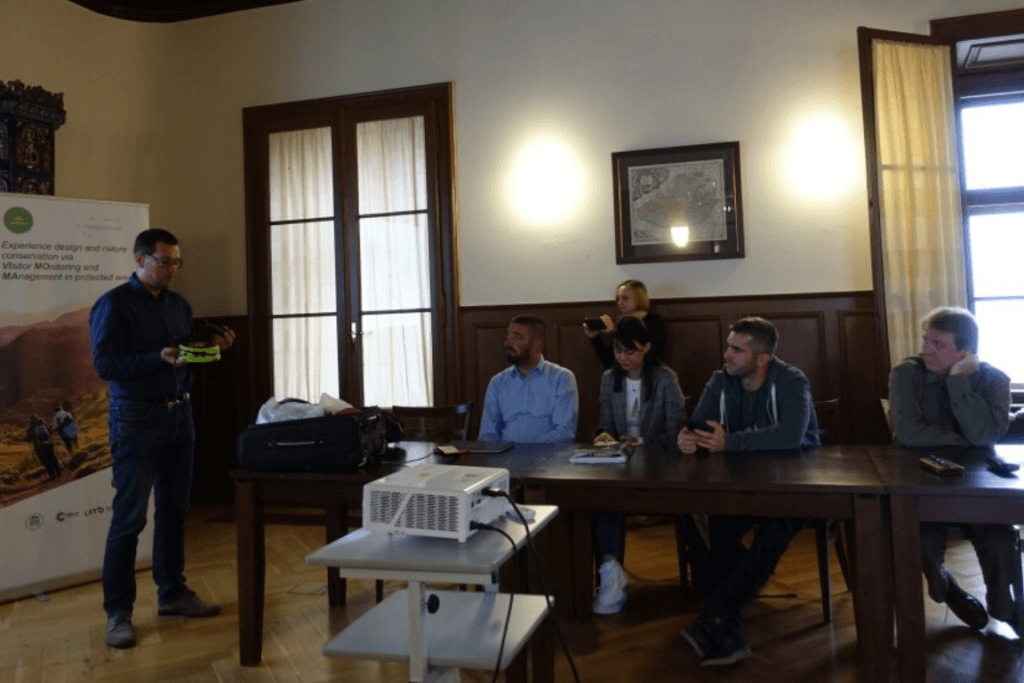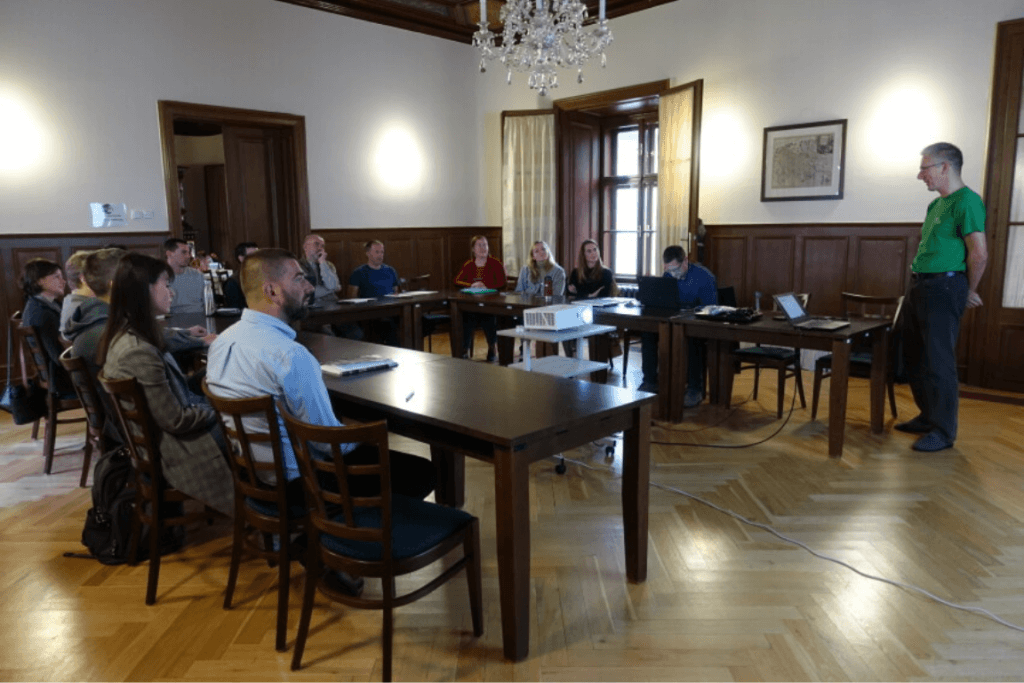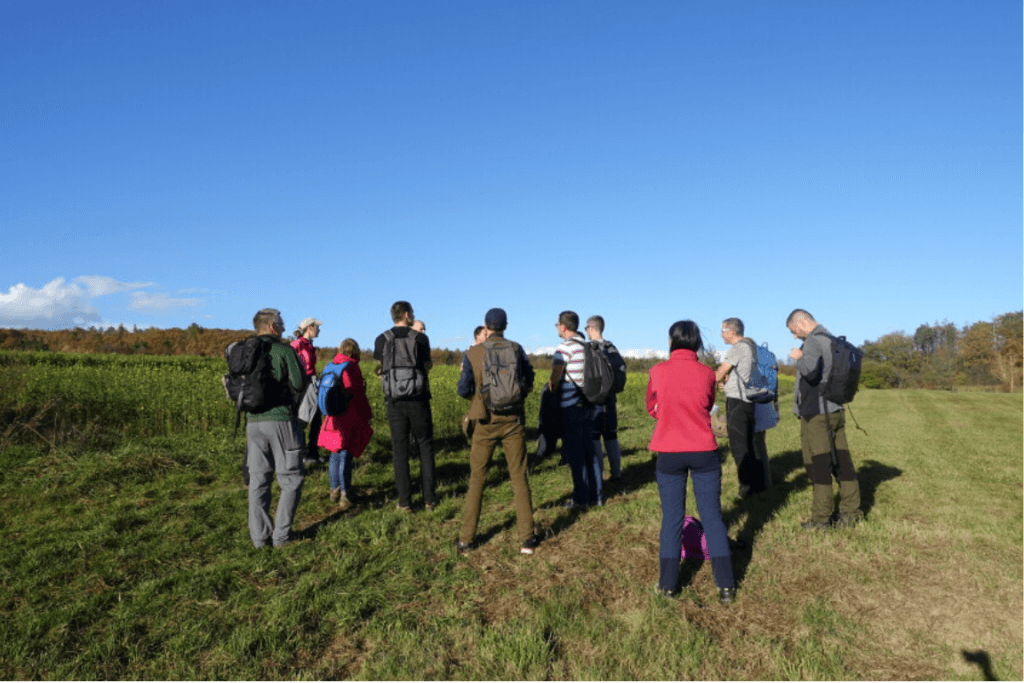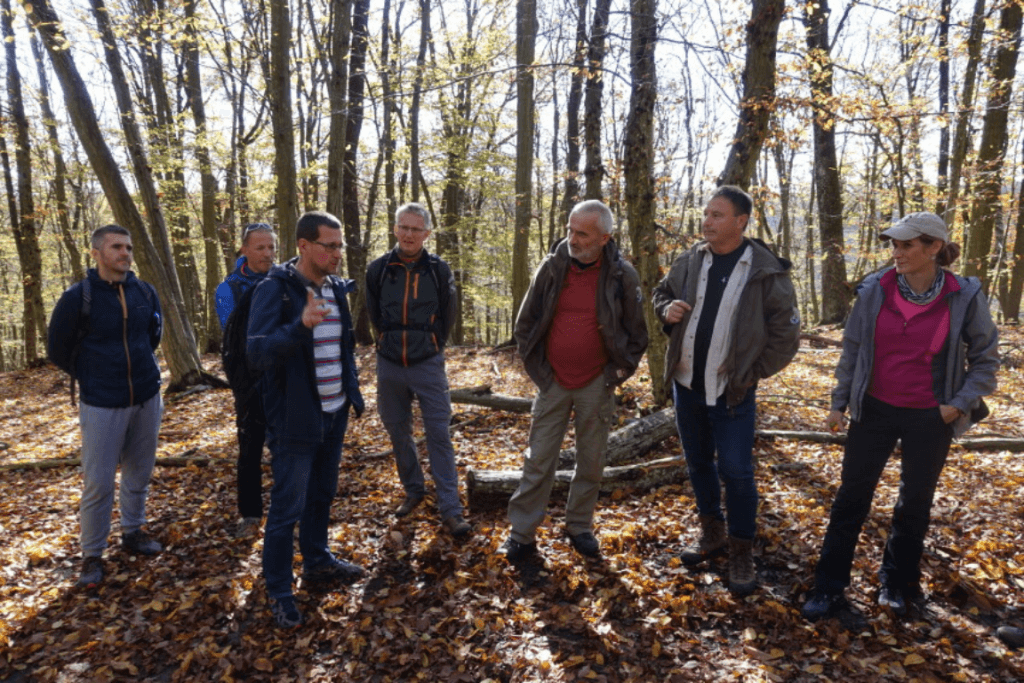The second workshop of the VIMOMA project was held between the 24 – 25th of October in Křtiny (Brno-Country District, Czech Republic). It aimed to introduce and discuss possible tools and methodologies for quantitative monitoring of visitors in protected areas.
The event was organised by Mendel University in Brno, Faculty of Regional Development and International Studies, and hosted at the university’s educational and conference centre in Křtiny Chateau, to which all the project partners and PA managers of each partner country were invited. The first day’s mostly theoretical part was backed by a field trip to Podyjí National Park (Znojmo district, Czech Republic) with practical demonstrations and detailed explanations of the NP’s currently used visitor monitoring practices.
The workshop was opened by Mr. Tomáš Vrška, CEO of the Training Forest Enterprise Masaryk Forest Křtiny, welcoming the attendees to the educational and conference centre in the heart of the Moravian Karst protected landscape area. The professional program was covered by two experts Mr. Ondřej Vítek, a representative of the Nature Conservation Agency of the Czech Republic, and Luboš Kala, Director of Partnerships at Ředitel Partnerství (a Czech environmental public benefit organisation). Ondřej Vítek presented the conflicts between visitors’ expectations and nature protection endeavours, explaining the importance of applying visitor monitoring methods in protected areas. Luboš Kala introduced the available tools and equipment to be used in PAs for quantitative monitoring. As Mr. Kala explained, choice of the suitable technology and location should be chosen according to the local needs. Possible issues of data sharing, processing and analysing were discussed as well. The afternoon section was dedicated to methodological issues of quantitative monitoring, explaining the benefits and limits of manual and automatic counting. The issue of the PA’s carrying capacity and limits of protected areas were also mentioned, and a discussion evolved between the representatives of the NPs, sharing their experiences and current challenges of visitor monitoring and environmental protection. Besides more regular tools and equipment for visitor monitoring, the potential of other methods, such as the use of cellular data, cyber guards and other technologies were also explored. The last topic focused on the principles of a responsible nature visitor. Throughout the day, all participants entered the discussion with their experiences and observations. The possibilities of working with counters in the winter months, new possibilities for their installation, and data evaluation were discussed.


The second day was reserved for field demonstrations at the Podyjí National Park, the field trip was led by Mr. Jan Kos and Mr. Vladimír Plaček, who both are National Park Service rangers. For the start, participants were welcomed at the national park visitor centre located in Čížov municipality (Znojmo district). A brief history of the NP was presented there, while the main tourist attractions and issues of impacts of tourism on nature were also introduced. Mr. Kos also explained the cooperation with Thayatal National Park (AT) in the protection and management of the two adjacent national parks. After the presentation of the park, the participants were taken through the territory of the park to the Czech-Austrian border in the village of Hardegg. As part of a walking tour, the park rangers and experts pointed out used monitoring tools and described the established long-term visitor monitoring systems.


The second meeting of the VIMOMA project was officially closed in the educational and conference centre Křtiny on the evening of the 25th of October. The next meeting and workshop will be held in Serbia (Novi Sad) in February 2023 with a focus on heritage interpretation and experience design for boosting visitors’ satisfaction.
Partners: Matej Bel University, Slovakia; Mendel University in Brno, Czech Republic; University of Novi Sad, Serbia; CEEweb for Biodiversity, Hungary; and Jagiellonian University, Poland.
Participant institutions: Babia Góra National Park, Bükki National Park Directorate, Ceeweb for Biodiversity, Fertő-Hanság National Park directorate, Jagiellonian University, Low Tatras National Park, Matej Bel University, Mendel University in Brno, Faculty of Regional Development and International Studies, Nature Conservation Agency of the Czech Republic, Partnership, p.b.o., Pieniny National Park, Podyjí National Park, Sutjeska National Park, University of Novi Sad, Faculty of Sciences.

More news
-
Another result of the project: Inequalities in health in the Czech Republic: the importance and relationship of population health determinants in territorial disparities is a podcast, which you can listen to bellow. What are the spatial…10. 7. 2024
-
Education for the hill tribes of northern Thailand
In the mountains of northern Thailand, particularly in the provinces of Chiang Mai and Chiang Rai, there are seven main hill tribes: the Akha, Karen, Lahu, Lisu, Lawa, Hmong and Yao. There are also smaller ethnic groups such as the Palaung and…15. 6. 2024 -
SUMMER SCHOOL PLAN:GEOGRAPHY AND THE UTILIZATION OF INSTRUMENTS FOR LOCAL…
Students interested in attending the Summer School should apply through CEEPUS for the 2023-2024 academic year, network CZ-111, by July 10th, 2024.Professors wishing to participate as lecturers must submit their applications by June 30th,…15. 6. 2024 -
Applications for the CEEPUS exchange programme are open!
Apply for mobility abroad in the winter semester within the CEEPUS programme! Where can you go?FRRMS students can primarily travel within the CZ-111 and AT-50 networks, or elsewhere as freemovers.Partner institutions can be found here: CZ-111…21. 5. 2024 -
Project “GUESS”
Experts from our faculty, together with experts from Hellenic Open University, Maieutica Cooperativa de Ensino Superior CRL, Universidad Politécnica de Cartagena, Panepistimio PatronTogether, they aim to give university students a better…13. 5. 2024 -
CEEPUS Exchange at University of Ljubljana: Implementing LEADER/CLLD:…
Retrieved from Irma Potočnik Slavič and Sara Mikolič. Dr Ondřej Konečný visited the Department of Geography of the Faculty of Arts of the UL from 8 to 12 April 2024 in the framework of the CEEPUS exchange. Within the CEEPUS mechanism,…20. 4. 2024 -
The current migration situation in Europe
Mgr. Martin Hrabálek, Ph.D., from the Institute of Territorial Studies, discussed the current migration situation in Europe on Thursday 18 April 2024 on TV Nova. If you are interested in this issue, you can watch the full recording below. Dr.…20. 4. 2024 -
PROJECT VINOMA
The two-year project that our faculty was part of has just ended. The project "Experience design and nature conservation via VIsitor MOnitoring and MAnagement in protected areas - #VINOMA", which was supported by the International Visegrad Fund,…17. 3. 2024 -
Apply for Summer School in Hungary!
You have until 15 April 2024 to apply for a summer school in Hungary. Date: 1. - 6. července 2024Topic: Exploring the different ways of small town development in Central and Eastern EuropeOrganiser and venue: University of Pécs, Faculty of…5. 3. 2024 -
In the scent of Tanzanian coffee
A coffee plantation is not just an avenue of coffee trees, the seeds must first root somewhere and grow in the right conditions. In the outdoor "greenhouse" with the coffee seedlings, they are only two weeks old and thrive well in the constant…22. 2. 2024